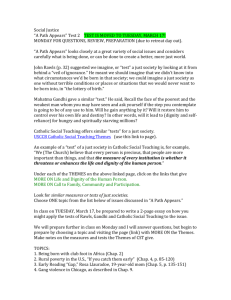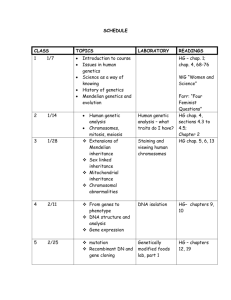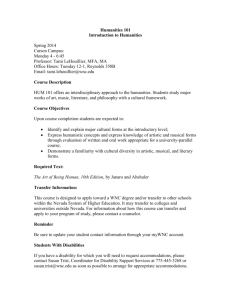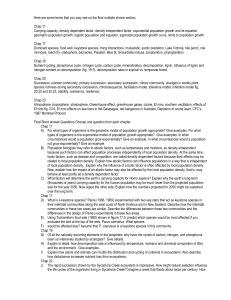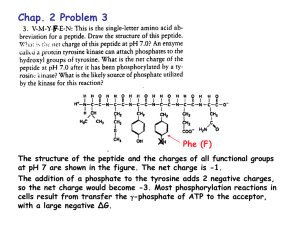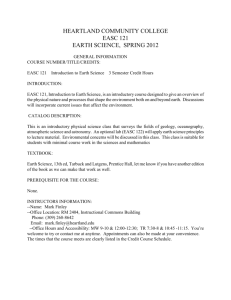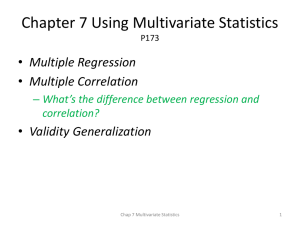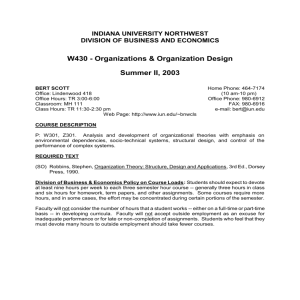Syllabus
advertisement
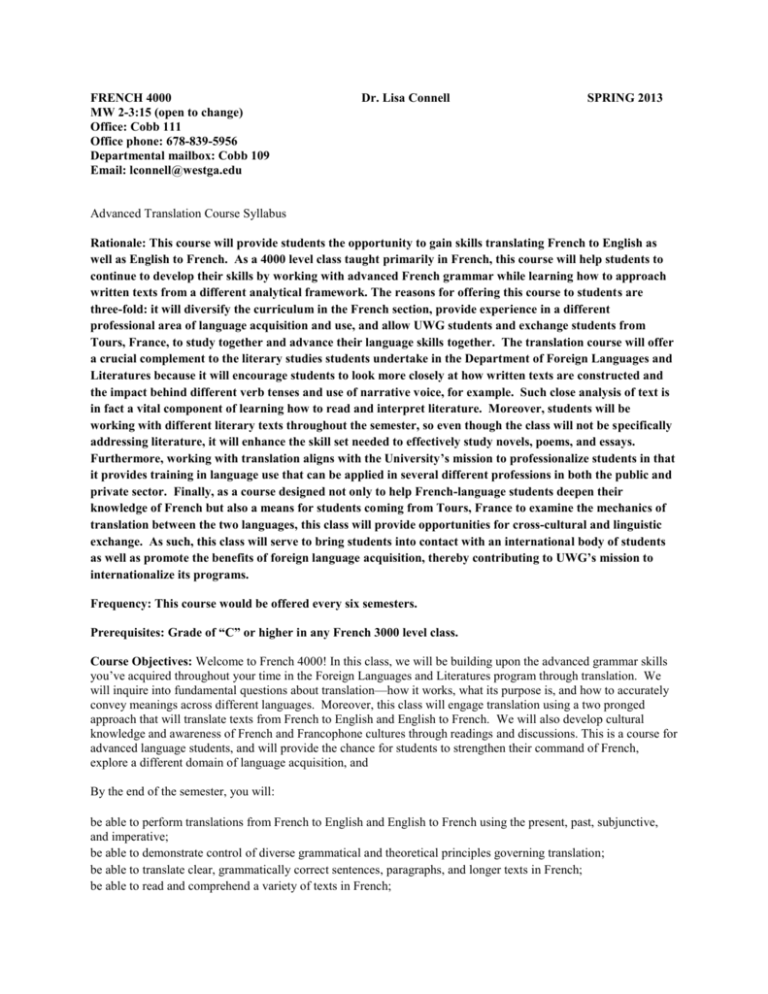
FRENCH 4000 MW 2-3:15 (open to change) Office: Cobb 111 Office phone: 678-839-5956 Departmental mailbox: Cobb 109 Email: lconnell@westga.edu Dr. Lisa Connell SPRING 2013 Advanced Translation Course Syllabus Rationale: This course will provide students the opportunity to gain skills translating French to English as well as English to French. As a 4000 level class taught primarily in French, this course will help students to continue to develop their skills by working with advanced French grammar while learning how to approach written texts from a different analytical framework. The reasons for offering this course to students are three-fold: it will diversify the curriculum in the French section, provide experience in a different professional area of language acquisition and use, and allow UWG students and exchange students from Tours, France, to study together and advance their language skills together. The translation course will offer a crucial complement to the literary studies students undertake in the Department of Foreign Languages and Literatures because it will encourage students to look more closely at how written texts are constructed and the impact behind different verb tenses and use of narrative voice, for example. Such close analysis of text is in fact a vital component of learning how to read and interpret literature. Moreover, students will be working with different literary texts throughout the semester, so even though the class will not be specifically addressing literature, it will enhance the skill set needed to effectively study novels, poems, and essays. Furthermore, working with translation aligns with the University’s mission to professionalize students in that it provides training in language use that can be applied in several different professions in both the public and private sector. Finally, as a course designed not only to help French-language students deepen their knowledge of French but also a means for students coming from Tours, France to examine the mechanics of translation between the two languages, this class will provide opportunities for cross-cultural and linguistic exchange. As such, this class will serve to bring students into contact with an international body of students as well as promote the benefits of foreign language acquisition, thereby contributing to UWG’s mission to internationalize its programs. Frequency: This course would be offered every six semesters. Prerequisites: Grade of “C” or higher in any French 3000 level class. Course Objectives: Welcome to French 4000! In this class, we will be building upon the advanced grammar skills you’ve acquired throughout your time in the Foreign Languages and Literatures program through translation. We will inquire into fundamental questions about translation—how it works, what its purpose is, and how to accurately convey meanings across different languages. Moreover, this class will engage translation using a two pronged approach that will translate texts from French to English and English to French. We will also develop cultural knowledge and awareness of French and Francophone cultures through readings and discussions. This is a course for advanced language students, and will provide the chance for students to strengthen their command of French, explore a different domain of language acquisition, and By the end of the semester, you will: be able to perform translations from French to English and English to French using the present, past, subjunctive, and imperative; be able to demonstrate control of diverse grammatical and theoretical principles governing translation; be able to translate clear, grammatically correct sentences, paragraphs, and longer texts in French; be able to read and comprehend a variety of texts in French; be able to demonstrate knowledge of different cultural aspects of the French-speaking world. Class-time: In addition to structured practice and review of written exercises, work in class will include frequent activities and assignments in small groups and pairs. Because learning depends on preparation, it is vital that every student commits to working diligently on in-class at at-home assignments. By doing so, you are not only advancing your own language skills and knowledge and preparing for quizzes, tests, and class projects, you are also contributing to your peers’ learning. The primary objective of class time is to allow you to deepen your knowledge of translation between French and English. In order to maximize the benefits of the time we have together, it is important to study vocabulary and the grammar points we are coving before coming to class. This will allow you to fully engage with the course material and to have a more positive learning experience. Moreover, this will enable you to more effectively ask questions about the course material in class. Please note that we will not be able to cover all of the material in class, so that you will need to study on your own the vocabulary and examples in the text we may not have gone over in class. Required Materials: The text is available at the bookstore and online. Please be sure to purchase the right edition of the text if you buy it online! 1) Textbook: Jones. Michele H. The Beginning Translator’s Workbook. Lanham, MD.: University Press of America, 1997. Optional: --Schaum’s French Grammar (4th or 5th edition), by Mary E. Coffman Crocker, McGraw Hill --A French/English, English/French dictionary (if you do not wish to purchase a dictionary, you may use the ones in the library or an online dictionary such as the one at http://www.WordReference.com). IMPORTANT: Bring the following to class each day, including test and quiz days: the text, paper for taking notes as well as in-class writing activities, and a pen! Requirements and Assignments: This syllabus is posted on CourseDen. Assignments will follow the outline at the end of this syllabus. The professor reserves the right to change the order, exercises or exam dates according to the needs of the class. Students must consult the Programme de la semaine on the class CourseDen at least twice a week for more detailed information on exact text pages and workbook assignments at CourseDen > Programme de la semaine. Assignments for the class will generally be posted a week in advance to provide for greater flexibility as concerns the needs of the class. If you do not have a computer or your computer is not working, you should access CourseDen via the Internet through one of the many campus computers available to you. Please check your UWG and CourseDen email daily. To log in to CourseDen, go to http://westga.view.usg.edu. IMPORTANT: Use Firefox as your browser! CourseDen works much more efficiently that way. Your username should be the same as your email username—for example, if your email is jdoe@westga.edu then your username is jdoe. Password: the last 2 digits of your birth year plus the last 4 of your SS# OR the same password you use for myUWG access—it depends on when your account was first loaded. If you cannot log in, call ITS (678-839-6248) and ask for help or a password reset.\ The course calendar is on page 3 of the syllabus. Written Homework: All homework needs to be completed before coming to class. Any assignment not turned in within the first five minutes of class will be considered late and will not be accepted. Quizzes and tests: There will be 3 brief quizzes (about 20 minutes) and two tests (a midterm and final) this semester that will evaluate different concepts of translation from English to French and French to English. Class projects: This class will have three projects that will showcase your translation skills. The first project will consist in translating a short literary excerpt into French. The second will be the creation of a current events magazine that will provide translations of newspaper articles about political, social, and cultural events, as well as other features of newspapers and magazines such as horoscopes, advertisements, editorials, and help wanted adds. The last project will be a bilingual creative short-story, where you’ll write and then translate a work of fiction. Course Calendar: Please see page 3 of syllabus (course calendar and content subject to change!) NB: the following times are based on the 2012 spring calendar and will be updated when necessary. le 9 janvier chap 1 le 11 janvier chap 1 le 16 janvier chap 2 le 18 janvier chap 2 le 23 janvier chap 3 le 25 janvier chap 3 contrôle 1 le premier février chap 4 le 30 janvier chap 4 le 6 février chap 5 le 20 février chap 7 le 8 février chap 5 First project due le 15 février chap 6 midterm le 22 février chap 7 le 27 février chap 8 le 29 février chap 8 le 5 mars chap 9 contrôle 2 le 12 mars chap 10 le 7 mars chap 9 le 13 février chap 6 le 14 mars chap 10 Second project due vacances de printemps vacances de printemps le 26 mars chap 11 le 28 mars chap 11 le 2 avril chap 12 le 4 avril chap 12 contrôle 3 le 11 avril chap 13 le 9 avril chap 13 le 16 avril chap 14 le 18 avril chap 14 Third project due The final will be a comprehensive exam covering all the material covered this semester and will be scheduled according to the timeline provided in The Scoop.
